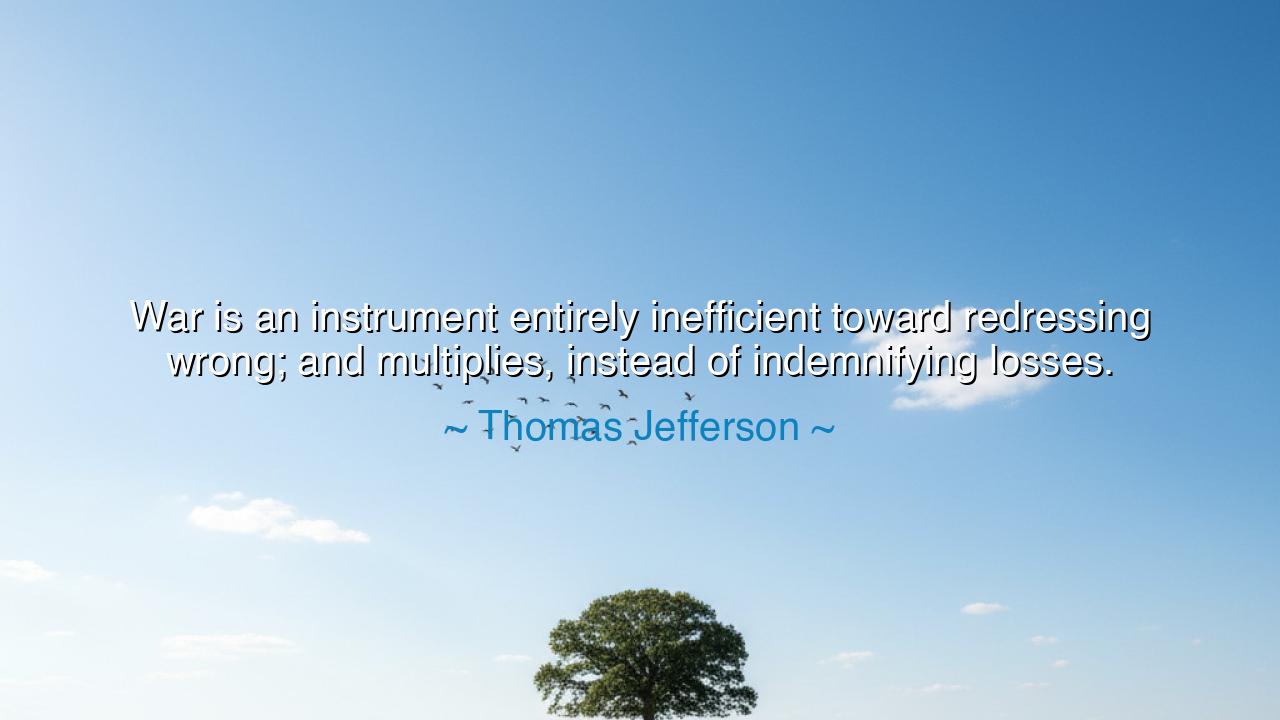
War is an instrument entirely inefficient toward redressing
War is an instrument entirely inefficient toward redressing wrong; and multiplies, instead of indemnifying losses.






Thomas Jefferson, wise statesman of a turbulent age, declared with clarity of vision: “War is an instrument entirely inefficient toward redressing wrong; and multiplies, instead of indemnifying losses.” These words, spoken not in the vanity of rhetoric but in the anguish of reflection, reveal a truth as ancient as mankind itself. For war, though often painted in colors of glory and justice, is in its essence a devourer, a beast that consumes without healing, that deepens wounds rather than binding them. Jefferson had seen the cost of battle, and in his spirit, he bore the conviction that swords rarely deliver justice—they only sow ruin.
Look, children of the future, at the fate of nations that have sought to cure wrongs through violence. They march forth claiming to avenge an insult, to reclaim honor, to secure justice. Yet when the dust settles, what remains? Fields are barren, treasuries emptied, families broken, and the supposed “wrongs” multiplied tenfold. The grievances that war was meant to erase instead become seeds of new hatred, waiting to sprout in the next generation. Thus Jefferson spoke not as a dreamer but as one who saw the iron chain of cause and consequence: war indemnifies nothing—it only multiplies loss.
Consider the tale of the Great War, which men later named the First World War. It began as a quarrel among monarchs, but quickly engulfed continents. Each side claimed to be redressing wrongs, punishing aggression, or defending honor. Yet when the cannons ceased and the armistice was signed, what was left? Millions of graves, broken empires, and bitterness inscribed into the very soil of Europe. And because the victors sought to redress through harsh treaties, the embers of vengeance ignited anew, leading to a second and greater fire—World War II. Here the wisdom of Jefferson was proven in blood: war does not heal—it breeds more war.
Even in the days of Rome, when legions thundered across the world, the same truth was manifest. The Republic, claiming to avenge insults or secure safety, unleashed endless campaigns. Each victory brought plunder, yes, but also more enemies, more resentments, more corruption within. Rome did not find peace through war; instead, she sowed the seeds of her own decline. Her coffers filled, but her soul emptied. What Jefferson warned of was not new, but eternal: war is a cycle of loss disguised as justice.
Yet take heed—this does not mean that one should submit blindly to tyranny or endure endless injustice. No, there is a place for resistance, for the defense of liberty, for the stand that must be made. But Jefferson’s cry warns us against believing that war itself is the tool of remedy. Justice cannot be built upon heaps of corpses; healing cannot flow from rivers of blood. True redress comes through wisdom, diplomacy, patience, and the courage to pursue peace even when pride demands revenge.
Therefore, let the lesson enter your hearts: when wrongs are done to you—whether by nations, by neighbors, or by those closest to your life—do not let anger drive you to the sword. Seek instead the higher path. Seek reconciliation if it is possible, understanding if it is within reach, firmness of principle without surrendering to rage. For even in your small life, the pattern of nations repeats: vengeance will not restore what was lost; it will only multiply your pain.
And so, children of tomorrow, mark Jefferson’s wisdom well. War is no cure; it is a poison. Strive to be healers, not destroyers. When wronged, ask: how may I right this without creating greater wrong? When injured, ask: how may I respond without multiplying loss? Build bridges rather than burn them. Speak words that bind wounds, not words that open them. And if you must fight, let it be not for pride or vengeance, but for the defense of life, liberty, and the chance for peace.
Remember: every battle avoided through wisdom is a victory greater than any triumph of arms. Every wrong addressed without violence is a triumph for humanity. Hold fast to this teaching, and you will walk as children of peace, preserving what is precious rather than multiplying the ruins of war.






HCHoang ha chi
Reading this makes me think about how nations justify war as a means to 'set things right,' only to leave generations grappling with deeper wounds. Jefferson’s idea suggests that the supposed gains are illusions masking enormous losses. I wonder how his philosophy would apply today, in an age of technological warfare and global conflicts. Would he still argue that war solves nothing, or has modern precision changed its moral calculus at all?
MMahmansucklolfucku
I find Jefferson’s statement idealistic but also realistic in a moral sense. It acknowledges that war, while sometimes portrayed as noble, is fundamentally self-defeating. Yet, what happens when injustice becomes unbearable and peaceful protest fails? Are there situations where war, however inefficient, becomes the only remaining tool for survival or defense? It’s a troubling paradox—condemning war while recognizing that sometimes it feels unavoidable.
QLquyet lai
This quote feels painfully accurate when you think about the aftermath of any major conflict. The destruction of infrastructure, the loss of lives, the trauma—these are costs that can’t be compensated. Even when a side 'wins,' both societies often end up weaker. It raises the question: can moral or political wrongs ever be 'redressed' through violence, or does war simply perpetuate cycles of harm that make real healing impossible?
PHPham Ha
Jefferson’s words resonate deeply, especially when we look at how wars often cause more damage than they resolve. It makes me wonder—if war is such an inefficient instrument, why does humanity keep resorting to it? Is it because we lack better systems for justice and reconciliation, or because emotions like pride and vengeance overpower reason? I’d love to know whether Jefferson believed peaceful diplomacy could ever truly replace war in human affairs.